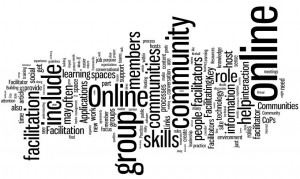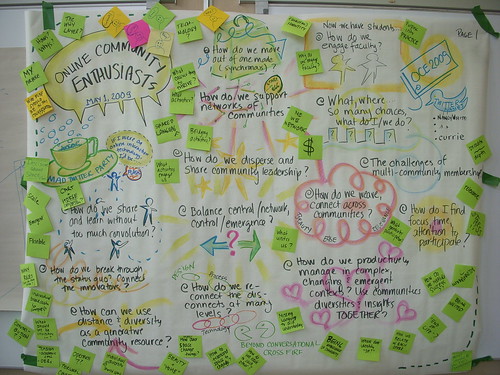
Tuesday saw Matt Moore of Innotecture and I at the Australian Technology Park facilitating two half day workshops on online communities. The morning was a small group focused on the newer practitioner, and the afternoon added a diversity of experienced and energetic online community managers and designers.
The morning’s small groups enabled us to go into details with each person and what they wanted to do online. This idea of the continuum from the individual, through bounded communities and out to networks again permeated my thinking and input, priming my pump for Friday’s keynote at Adelaide’s EDayz09. More on that later…
In the afternoon, Matt and I decided to use some exercises to help raise the range of issues associated with advancing an online community by looking at current states of people’s communities, how they got that way and possible positive and catastrophic futures. Frankly, there were some good starts to conversations, but the diversity of the group and the speed at which we went through the exercise did not completely satisfy me – nor I suspect, many of the participants. Matt later reflected that we just made it too complicated and I think he was right. When you have advanced practitioners, the key is to let them share and compare.
I’m always torn when I’m “giving” a workshop. Matt and I have tons of things we can “present” and “talk” about, but that goes counter to a lot of what we preach in terms of participatory processes. Yet content gives an hand hold, an affordance, an anchor to focus conversations. I think we need to get the mix — so we are refining for Melbourne next week where we’ll run the same pair of workshops again on Tuesday.
For me, the highlight was again meeting all the great, interesting and intelligent people and hearing their stories. I look forward to more.
 This curriculum and materials have not been updated in many years, but they are still a valuable resource that emerges from not only my work, but that of my teachers, Lisa Kimball, Howard Rheingold, Michele Paradise and many, many others. In a way, they are a glimpse back into the early days of the practice of online facilitation.
This curriculum and materials have not been updated in many years, but they are still a valuable resource that emerges from not only my work, but that of my teachers, Lisa Kimball, Howard Rheingold, Michele Paradise and many, many others. In a way, they are a glimpse back into the early days of the practice of online facilitation.
 Having been in the “online community” world since around 1997, I have seen “community” ebb and flow. What is different this time around is the credibility that is given to those talented individuals who help steward, facilitate, care, lead, host, cajole and even “manage” online communities. While we can quibble for hours about the definition of online community (and what is or isn’t a community), the role of supporting these things finally has arrived with legitimacy. (That means people sometimes actually get PAID to do the work! Amazing!)
Having been in the “online community” world since around 1997, I have seen “community” ebb and flow. What is different this time around is the credibility that is given to those talented individuals who help steward, facilitate, care, lead, host, cajole and even “manage” online communities. While we can quibble for hours about the definition of online community (and what is or isn’t a community), the role of supporting these things finally has arrived with legitimacy. (That means people sometimes actually get PAID to do the work! Amazing!) I have fallen deeply in love with graphic facilitation and graphic recording at face to face events. As the person doing the graphics, I listen much more deeply. That is saying something for someone who often talks a lot. But more than that, I have found that images are:
I have fallen deeply in love with graphic facilitation and graphic recording at face to face events. As the person doing the graphics, I listen much more deeply. That is saying something for someone who often talks a lot. But more than that, I have found that images are: Next in the podcast series on social media in international development is a dear friend and colleague, Simone Staiger discussing the design, technology and facilitation of a global e-consultation. Simone is orchestrating 6 regional consultations for the Global Forum on Agricultural Research (
Next in the podcast series on social media in international development is a dear friend and colleague, Simone Staiger discussing the design, technology and facilitation of a global e-consultation. Simone is orchestrating 6 regional consultations for the Global Forum on Agricultural Research (